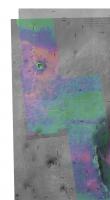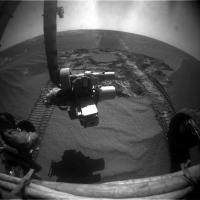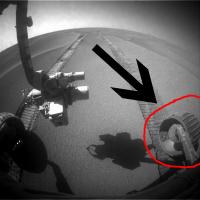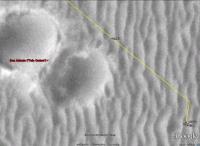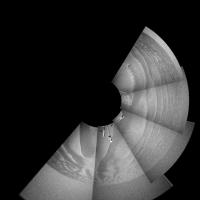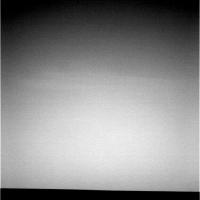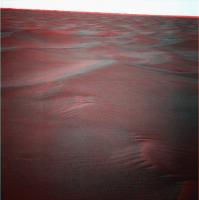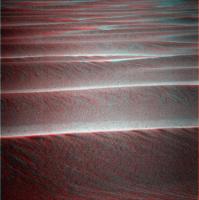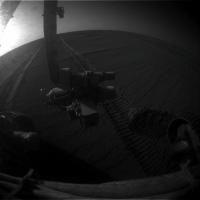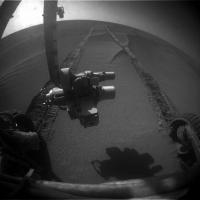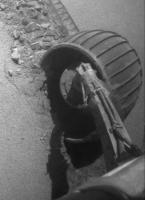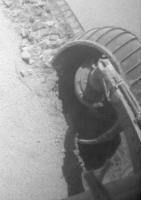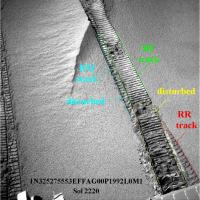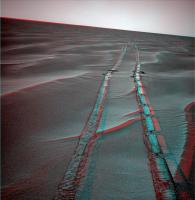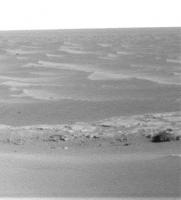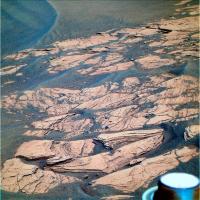Printable Version of Topic
Click here to view this topic in its original format
Unmanned Spaceflight.com _ Opportunity _ Southward from San Antonio to the Next Waypoint
Posted by: Zeke4ther Apr 2 2010, 03:38 AM
It seems about the right time to start a new thread as we have now turned East to Endeavour.
Hope no one minds...
Posted by: Tesheiner Apr 2 2010, 05:03 PM
It's ok to move to a new thread but it should not be constrained by that http://www.unmannedspaceflight.com/index.php?s=&showtopic=6501&view=findpost&p=157962. There's no ground feature at that point.
I would propose to keep this thead until the next science stop.
Posted by: ElkGroveDan Apr 2 2010, 06:09 PM
Based onhttp://www.unmannedspaceflight.com/index.php?act=attach&type=post&id=21257, we need to throw a party of some kind between here and that dogleg in the route to celebrate the end of the hazardous dunes. Let's hope we see a whole lot more 200 meter drives from here on out.
http://www.unmannedspaceflight.com/index.php?act=attach&type=post&id=21257
Posted by: BrianL Apr 2 2010, 06:36 PM
I could be wrong, but I don't see them going back to 200 m drives ever again, even when Oppy hits nice flat tarmac. I thought they went to shorter drives for the sake of wheel longevity. I would be happy with 100 m drives, and a complete absence of attention-diverting cobbles between here and Endeavour.
Posted by: jamescanvin Apr 2 2010, 07:07 PM
Yeah, I don't think we'll see anything much over 100m
Not only that, but if IIRC at about that dogleg, Oppy will be as far from Duck Bay as she was at Eagle Crater!
Posted by: marsophile Apr 2 2010, 08:34 PM
Does the lack of ripples in the green region imply a wind-sheltered area? If so, Oppy might be deprived of those beneficent Spring gusts to clean the accumulated dust off the Solar panels. In that case, it might be advisable to make haste in the traversal to Endeavour (balancing the power risk against the mobility risk).
Posted by: ElkGroveDan Apr 2 2010, 08:55 PM
Not necessarily. As I recall Oppy's first cleaning events occurred back near Endurance. As I recall it was shortly after emerging from the crater but still on the nice clean tarmac up there.
Posted by: Bobby Apr 2 2010, 08:57 PM
I think this new start to the drive from Twin Craters is going to be a long one without a stop to investigate
anything. I see nothing interesting for a while unless they spot something. I do hope we go 1 or 2 KM this time
before we do another science stop???
I do have one question: Is Stu a Comedian ![]()
Posted by: nprev Apr 2 2010, 09:10 PM
It is indeed kind of tempting to think that we're in "nothing to see here, move along" mode by now. Looks like transit time-wise we're probably still at least an Earth year away from the outskirts of Endeavour, though, and there's got to be a balance between science return during that period vs. the admittedly very exciting possibility of examining phyllosilicates at the end of this road.
Not an easy set of calls to make (it'll be an ongoing process). It's incumbent upon the MER team to make every day of Oppy's mission as scientifically productive as possible, and it's by no means guaranteed that she'll survive to reach Endeavour. Wonder if they're using any sort of systems optimization models to aid their decision making.
Posted by: Stu Apr 2 2010, 09:20 PM
Er...?
Posted by: fredk Apr 2 2010, 09:28 PM
I think what's happened at San Antonio/Twins is a sign that it'll take a lot now for the team to decide on a long science stop. The Black Cat rock wasn't deemed worth a closer look. Perhaps they decided it was probably another iron meteorite and since we've studied several now, it wouldn't add much to study another.
On the other hand, I'm not sure about the exact timing of the 2199 drive away from San Antonio. Was that drive sequenced before or after the first navcams showing Black Cat came down? Could we be in another Block Island situation here?
Once and if the surroundings change significantly from what we've been seeing at Meridiani (perhaps roughly halfway to Endeavour??), then I could see more science stops to study the new stuff.
Posted by: marsophile Apr 2 2010, 09:40 PM
Concepción was interesting enough that we could have "eaten the lotus" there and stayed a long time. However we had our Odysseus (Squyres?) to force us back on to the path to Ithaca (as Rui used to call Endeavour). It will be difficult for any other potential stop to match Concepción in interest.
Posted by: climber Apr 2 2010, 09:46 PM
Don't bet on that marsophile, we're on Mars...
Posted by: Tesheiner Apr 2 2010, 11:16 PM
Or the opposite maybe? I would like to see that topographic picture provided by tim53 overlayed on James' terrain analysis map; I have the impression that the "green" area fits more or less with the downslope part of the route and we may have a direct-hit from the wind there.
On the other topic, and speaking of science stops, I think there have been two reasons for those: the first one has been already addressed here but the second is the periodic need to put the wheels to rest due to high currents. Given that the rover is currently power limited due to the winter so the drives are shorter and with recharging sols planned from time to time, we may have the luck to avoid those "technical stops" until the winter is over.
My 2c.
Posted by: Explorer1 Apr 2 2010, 11:33 PM
So even if we find the ideal terrain, like at the landing site, there will still be no 'pre-Purgatory' style drives, correct? Even Oppy is showing her age...
Posted by: fredk Apr 3 2010, 03:21 AM
http://twitter.com/marsroverdriver/status/11503361930
Posted by: Tesheiner Apr 3 2010, 09:29 AM
Correct. Due to the stress on the RF wheel and also because right now there's not enough power for long drives.
And since we're talking about long drives, I think it's worth to mention http://marsandme.blogspot.com/. Just in case there's anyone here not aware or not following that blog, the narration is currently right on those 'pre-Purgatory' days.
Posted by: brellis Apr 3 2010, 12:42 PM
thx for the pointer to Scott's blog ![]()
Posted by: climber Apr 3 2010, 07:54 PM
There's something I'm not sure to understand about the new AEGIS software uploaded recently. I understand that Oppy (& Spirit) can choose to image a rock by herself among other rocks but I'm not sure she can point a Marquette Island type of rock so Mission control could be aware she "saw" something (even during a sol drive) and re-scheduled following sol.
Somebody get an answer to this?
From A.J.S Rayl monthly report:
"Now, Opportunity can use AEGIS at stop points along a single sol's drive, or at the end of the drive, to identify and examine targets of interest that might otherwise be missed"
Posted by: Explorer1 Apr 3 2010, 07:55 PM
I already have it bookmarked, chiefly to wait for his reaction to the Day Everything Changed, if you know what I mean.
Posted by: SteveM Apr 3 2010, 09:10 PM
Somebody get an answer to this?
From A.J.S Rayl monthly report:
"Now, Opportunity can use AEGIS at stop points along a single sol's drive, or at the end of the drive, to identify and examine targets of interest that might otherwise be missed"
Here's http://scienceandtechnology.jpl.nasa.gov/newsandevents/newsdetails/?NewsID=677. From the description, I suspect they'd get some information about any autonomously programmed images fairly fast, but it's not clear whether it would be in time for scheduling the next SOL's activities
Steve M
Posted by: climber Apr 3 2010, 09:23 PM
Thanks Steve, even if this doesn't answer my question, it worth reading.
Posted by: Floyd Apr 3 2010, 10:17 PM
What AEGIS catches on a drive-by is the odd rock that its program finds interesting and takes 12 filter images, and the rover drives on. In the past, the next day scientists would see something in a navcam drive-by image and say, gee, that is an interesting rock, too bad we don't know its spectral characteristics, but it isn't (most of the time) worth going back to to get images. Now they have information on a rock they couldn't target without backtracking. Something like Marquette Island is the exception--where after the images come down, the decision is that it is so important that backtracking is necessary.
Posted by: Bill Harris Apr 4 2010, 01:51 AM
Agreed. I look at the AEGIS subroutine as a logical extension of the existing autonomous drive capability. Byte-wise, an interesting rock is no different than a hazard to avoid.
In a way, this gives Oppy a capability that has been lacking: the ability to make observations on the fly without grinding to a halt. A carbon-based geologist, while walking a traverse, will spot an interesting rock or outcrop feature in the distance and will slightly alter course to pass nearby for a closer look or keep going if it's not that unusual, all without losing much time. I've done it hundreds of times, and I'm sure it's still done today.
This leg of the traverse is getting into a different ripple regime, and with a change in elevation, a lower part of the geologic section, so the ability to look sharply around will be critical.
--Bill
Posted by: ElkGroveDan Apr 4 2010, 02:53 AM
... whereas a silicon based geologist just burns a hole through everything in its way and keeps on going.
Posted by: CosmicRocker Apr 4 2010, 06:11 AM
That sounded like an interesting proposal to me, so here it is...Tim's topographic contours on top of James's ripple map. I was not able to perfectly register the two maps through any simple combination of rotation and/or scale changes; so this result is my manual, best average registration. It is good enough, however, to show that Eduardo's hunch was correct. Very good questions remain. Is the downslope region devoid of large ripples because the wind is stronger or weaker there? We know most of the ripples don't move in the current wind regime, but perhaps the trend is the same even in the current wind regimen.
Posted by: climber Apr 4 2010, 10:41 AM
Looking it at a larger scale, it may be possible that the Endeavour ring, I mean the hills South East of the actual position could deflect the wind it the direction of the "green" area (this would mean that the dominant wind comes from the South East). It could also be the other way around: the eleavtion slowing down a dominant North West wind. Anyway, looking at CosmicRocker rendering, the ring elevation seams to have some effect.
Posted by: Bill Harris Apr 4 2010, 03:05 PM
The ripples are changing because of an increase in wind velocity.
When we reached Concepcion we noticed the presence of transverse dunes (ripples), which suggested either an increase in sand availability or an increse in wind velocity. I initially thought of an increase in sand supply since there is a great deal of weathering of the fragmented rock around the fresh crater, but as we traveled southward ("upwind") of the crater, the transverse dunes were still present and by the time we got to the older, weathered San Antonio craters, we also started seeing scalloping of sand on the ripple crests (erosion).
Concepcion was on the crest of a slight topographic high and the surface to San Antionio is essential flat or with a slight southward dip, and from the Tim Parker topo map, we see that the elevations decrease sharply to the south and southeast.
Air moving in a laminar flow at altitude encounters the hillside and since the cross-sectional flow area is decreased, the velocity will increase due to a venturi effect.
You can also see an increase in bare bedrock areas between here and "mini-Endurance", which I had hoped would be an indication of a change in lithology due to a drop in elevation, but, alas, appears to be less sand because of more wind...
Attached is a drawing illustrating the orographic effect, adapted from an earlier topo x-section by fredk.
--Bill
Posted by: climber Apr 4 2010, 03:41 PM
Thank you Bill.
I was talking of a venturi effect due to the Endeavour rim. Is this consistent with your explanation or not necessary?
Thanks
Posted by: eoincampbell Apr 4 2010, 05:42 PM
Should we then, expect a cleaning event on the brae sometime soon?
Is the long trek actually possible without one?
Posted by: fredk Apr 4 2010, 05:58 PM
It's worth keeping in mind that the upcoming drop down to Endeavour has a slope of only a percent or so. Meridiani is very flat. I'd be surprized if that gave much venturi effect, though I'm really not sure about this. I could see local features (craters) or large scale features (Endeavour rim) affecting the winds.
Posted by: Tesheiner Apr 4 2010, 08:48 PM
It was executed some hours ago but I would call it "aborted" or so. The net move was just 1m.
Posted by: nprev Apr 4 2010, 09:19 PM
Whups. Haven't had that happen for awhile, right?
Posted by: Stu Apr 4 2010, 09:24 PM
Word has it Oppy refused to move because the drive coincided with the last episode of "Wonders of the Solar System"... ![]()
Posted by: SFJCody Apr 5 2010, 09:06 AM
![]() Please don't be a dead wheel, please don't be a dead wheel...
Please don't be a dead wheel, please don't be a dead wheel...
Posted by: Hungry4info Apr 5 2010, 09:39 AM
Re: SFJCody'
Ahh fudge there went my whole day. ![]() Guess I'm slacking off on the pessimism.
Guess I'm slacking off on the pessimism.
Unless we hear otherwise, I'm going to assume it was just a software glitch.
Posted by: Sunspot Apr 5 2010, 10:53 AM
And this isnt a very interesting place to spend the rest of the mission, at least Spirit had something interesting to look at while stuck.
Posted by: PaulM Apr 5 2010, 11:02 AM
I asked Scott Maxwell the following question on his blog:
http://marsandme.blogspot.com/
I found Opportunity's rate of progress around SOL 400 amazing. I have heard rumours that Opportunity will soon reach easy driving country again. If so then will we be at Endeavour crater sooner than we all expect?
Scott's answer was:
We will indeed reach a nice flat zone in another kilometer or so. Once we're there, the terrain will again support longer drives, and we're looking into techniques to do those safely with the current hardware.
But what's currently constraining our progress is less the terrain and more the condition of the right front wheel: we're sticking to 70m/sol as a way to keep that wheel healthy, and if in fact we need to continue to do that, it won't matter how benign the terrain is. It wouldn't do us much good to cover 200m/sol for a few weeks, only to kill that wheel.
I should add that just now our progress is further constrained by the lower energy levels we're experiencing as a result of Martian winter's onset, but that will relax after solstice.
So, for now, you should figure that the flat terrain will still have a 70m/sol speed limit. We'd like to raise that limit just as much as you would, though, and we certainly will if we can!
Posted by: Bill Harris Apr 5 2010, 11:04 AM
--Bill
Posted by: Tesheiner Apr 5 2010, 01:49 PM
> So, for now, you should figure that the flat terrain will still have a 70m/sol speed limit. We'd like to raise that limit just as much as you would, though, and we certainly will if we can!
I can see that speed limit. ![]()
Posted by: BrianL Apr 5 2010, 02:21 PM
With Scott's talk of purgatoids lurking about, I'm wondering if we encountered some soft ripple and stopped from slippage. The last turn in place looked a bit... http://nasa.exploratorium.edu/mars/opportunity/rear_hazcam/2010-04-01/1R323413046EFFAENTP1312R0M1.JPG?
It would be nice to see the latest hazcams but as often seems to happen when something unusual occurs, exploratorium is late in delivering the goods. Coincidence?
Posted by: ElkGroveDan Apr 5 2010, 02:47 PM
As I recall the wheel current issues were somewhat alleviated by reversing driving direction now and then. I wonder if they have considered a pirouette kind of driving routine for long distances. The rover would drive 40 meters or so, stop and turn 180 degrees and resume driving in the other direction. While that might be hazardous around purgatoids, out on the flat plains it might make sense.
Posted by: fredk Apr 5 2010, 03:50 PM
Paolo's posts are a goldmine of information. In http://www.unmannedspaceflight.com/index.php?s=&showtopic=6022&view=findpost&p=141675 he mentions that RF currents drop substantially on bedrock. Perhaps we can expect some drop in current on flat tarmac compared with the current ripples? I'm thinking along the lines of Spirit's wheel resistance in Troy that was reduced when they did the swimming stroke motions? Of course Spirit's case was much more severe. But perhaps a reason to hope for slightly longer drives on the tarmac.
Posted by: Tesheiner Apr 5 2010, 04:02 PM
AFAIK, this kind of manouver was already executed during the long drives right after leaving Victoria. Once again, Paolo is the http://www.unmannedspaceflight.com/index.php?s=&showtopic=5593&view=findpost&p=130262.
The first 50 or 80m of a drive were covered moving backwards in "blind mode" and the remaining part moving forward in autonav.
Posted by: fredk Apr 5 2010, 08:29 PM
That image is from the previous drive. On 2202 we perhaps dug into a dune enough to trigger an abort? Here's the F hazcam:
http://qt.exploratorium.edu/mars/opportunity/forward_hazcam/2010-04-05/1F323672715EFFAENVP1211R0M1.JPG
Posted by: Tesheiner Apr 5 2010, 08:31 PM
Climber, that's an old picture from about a week ago.
This is the latest fhazcam picture; in any case no visible problem.
http://qt.exploratorium.edu/mars/opportunity/forward_hazcam/2010-04-05/1F323672715EFFAENVP1211L0M1.JPG
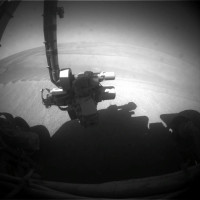
Posted by: climber Apr 5 2010, 08:35 PM
Sorry, 1 m drive, then abort, corresponded too much to what I though was the right one, so I didn't double checked.
Thanks for correcting.
Posted by: Tesheiner Apr 5 2010, 09:05 PM
FWIW, the next drive is on sol 2204 i.e. tomorrow.
Posted by: JayB Apr 6 2010, 12:51 AM
looks like we're ok
@marsroverdriver Oppy drove more like 1m than 50m this weekend: an "embedding detector" tripped. It's conservative; we're demonstrably not embedded. Onward!
Posted by: Tesheiner Apr 7 2010, 05:50 AM
Still waiting for the latest pictures to confirm it but AFAIK yestersol drive covered just 1m once again. ![]()
Posted by: nprev Apr 7 2010, 05:58 AM
Hmm. Well, if this is true, then at least the fault condition seems both predictable & consistent in its behavior. An incorrect flag trip setting (slope, wheel rotation vs. intertial distance traveled, something like that) or something with the new AEGIS capability?
Whatever it is, hopefully it won't to be too difficult to find with two occurrences to study now. Oppy's actually in a pretty good place (literally) at this time for debugging.
Posted by: ElkGroveDan Apr 8 2010, 03:23 AM
That must be what it is. AEGIS keeps spotting these fascinating round rocks and wants to stop to examine them.
Posted by: Explorer1 Apr 8 2010, 04:00 AM
Woops! That would be more funny than annoying if it was true! Imagine what the mass media would say, if they cared.![]()
Posted by: fredk Apr 8 2010, 04:07 AM
The http://marsrovers.jpl.nasa.gov/mission/tm-opportunity/opportunity-sol2204.html confirms a very short drive on 2204.
It's tough without images, eh?
Posted by: Tesheiner Apr 8 2010, 03:58 PM
Yup. I'm missing my daily fix. ![]()
While waiting for today's drive (attempt), here's a GE snapshot with the last two steps compared with a normal 50m drive.
Posted by: Gonzz Apr 8 2010, 04:12 PM
Maybe this second 1m drive was due to manouvering in order to cross the dune at a better spot
Posted by: Hungry4info Apr 8 2010, 05:20 PM
Sure hope you are wrong. If we have to spend a few days manoeuvring around to cross any average dune, our progress toward Endeavour will be... hindered.
Posted by: Gonzz Apr 8 2010, 06:10 PM
well... then maybe they want to take a close look at what exact conditions tripped the embedding detector so they can avoid more occurrences like these.
Guess I'm hoping all is right and just trying to think at positive scenarios.
Slow days like today at the forum mars section with no progress and no pictures really bring the marsaholic withdrawall synptoms to light and give a glimpse of what it'll be like once these wonders stop roving.
Posted by: elakdawalla Apr 8 2010, 06:43 PM
Looking for something to do on Mars? Rove over the latest HiRISE releases, or, better yet, wander through the CTX archive (http://bit.ly/csbOd9) -- nobody is paying much attention to those and there are boatloads of stunning photos.
Posted by: Nirgal Apr 8 2010, 09:58 PM
How true ... roving the HiRISE releases alone will keep me busy for the next 10 years at least
Posted by: Geert Apr 9 2010, 12:07 AM
see http://marsrovers.jpl.nasa.gov/mission/status.html#opportunity
Opportunity had a couple of difficult moves this week.
After taking some time to recharge her batteries, the rover attempted a drive on Sol 2202 (April 4, 2010). That drive stopped after the initial arc turn due to elevated current draw in the motors on the right side of the rover. The rover is between two ripples with the space in between forming a bowl. The rover had to push harder on the right to make the sharp turn. Conservatively-set current limits stopped the drive, as a way for controllers on the ground to assess the driving conditions before proceeding.
With everything looking okay, another drive on Sol 2204 (April 6, 2010), was commanded. It too began with a short, sharp arc. This time the drive stopped after a short distance because of wheel slip exceeding the limit of 40 percent. Again ground controllers assessed the conditions and found no problems. With these sharp turns, the rover's wheels must impart more thrust. When the wheel thrust exceeds the shear strength of the terrain, slip occurs.
Opportunity will drive again on Sol 2206 (April 8, 2010). This time the rover is already aligned with the drive direction, so no sharp turns are needed. Extra slip checks will be performed to make sure there are no terrain issues. As of Sol 2204 (April 6, 2010), the solar array energy production was 235 watt-hours with an atmospheric opacity (tau) of 0.371 (from Sol 2199) and a dust factor of 0.500.
Total odometry is 20,247.56 meters (20.25 kilometers, or 12.58 miles).
Posted by: nprev Apr 9 2010, 12:24 AM
![]()
Thanks, Geert. All is well.
Posted by: Tesheiner Apr 9 2010, 05:45 AM
Yep. The drive was successful and 50m were covered during 2206. ![]()
But the images are still unavailable. ![]()
Posted by: climber Apr 9 2010, 07:31 AM
IIRC, Spirit RF died right after a sharp turn. May be the problem has nothing to do with the sharp turn but, I still don't understand why we're still using this manoeuver instead of backing off a bit and use a smoother turn.
Sorry if my remark is a bit "sharp" (ok, I'm a back seat driver etc) but I've been afraid since march 12th 2006 using this manoeuver again. Is the current rise showing I've been right?
Posted by: Sunspot Apr 9 2010, 07:47 AM
Its been offline for as long as 10 days before.
Posted by: djellison Apr 9 2010, 08:02 AM
Because a 'smoother' turn would involved ploughing straight thru the dunes. Remember, Opportunity has a stuck FR steering actuator - so turning in place is not idea.
Posted by: climber Apr 9 2010, 10:55 AM
Yep, good point Doug!
Posted by: Tesheiner Apr 11 2010, 08:54 AM
Thread bump, althought there's not so much to discuss given the lack of images. The official website is not updating too so my guess it that the issue should be in the common feed from JPL (assuming that common point exists).
Meanwhile, just say that the drive on sol 2208 was executed and another 55m were added to the odometer. Here are some navcam thumbnails from the tracking website.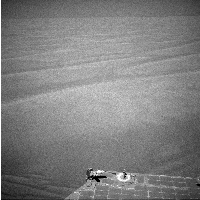
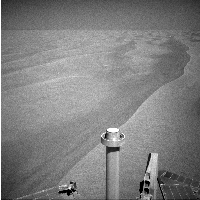
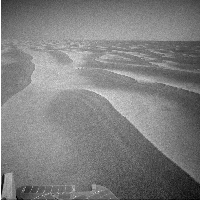
Posted by: briv1016 Apr 11 2010, 10:01 AM
I was bored so I tried to eyeball the Navcam thumbnails in photoshop. It's pretty bad; I'm sure one of the resident experts can do a better job. (Hint, Hint. ![]() )
)
Posted by: Tesheiner Apr 11 2010, 10:16 AM
I did the same thing (similar result) to obtain a polar view and see if it was not too bad to use on "fine tuning" the rover position on the map. The mobility info from the tracking site is not perfect and usually there are a few meters difference wrt the position I get by means of mosaics registration on the map.
Posted by: alan Apr 11 2010, 03:18 PM
I noticed that the pancam drive direction images are aimed to the east.
Posted by: Phil Stooke Apr 11 2010, 04:14 PM
Yes, they just bypassed a clump of larger drifts.
Phil
Posted by: ElkGroveDan Apr 11 2010, 04:19 PM
Soon worries about drifts and dunes will be ancient memories.
Posted by: SFJCody Apr 11 2010, 05:55 PM
I'm pretty sure they're now closer to Endeavour than they've ever been before. The sol 1927 record is broken!
Posted by: MoreInput Apr 11 2010, 06:04 PM
Driving on meridiani planum is difficult, so maybe some signs may help our brave rover drives.
Posted by: BrianL Apr 11 2010, 07:09 PM
Eeeeeee... that's on a par with saying that a goaltender is one minute away from a shutout.
Posted by: CosmicRocker Apr 12 2010, 06:58 AM
That's a great idea. Pardon me, but I just had to add one more important warning.
Posted by: antoniseb Apr 12 2010, 12:09 PM
Soft Shoulders
(The signs are all great! Let's roll!)
Posted by: ElkGroveDan Apr 12 2010, 04:49 PM
From here the view of the jpeg artifacts is among the best in the Solar System.
Posted by: Tesheiner Apr 12 2010, 05:28 PM
I think we are all seeing the effects of a missing daily fix of pictures. ![]()
Posted by: alan Apr 12 2010, 06:02 PM
All the signs littering the landscape reminds me of http://www.youtube.com/watch?v=yjiGH9QNiU0
Posted by: fredk Apr 12 2010, 07:48 PM
The drought is over! Pics down up to 2208:
http://qt.exploratorium.edu/mars/opportunity/navcam/2010-04-12/1N324203025EFFAFDXP0675R0M1.JPG?sol2208
Posted by: Tesheiner Apr 12 2010, 08:08 PM
Ahh. Finally! ![]()
This is a fhazcam from this last batch taken on sol 2206 where we can see the "sharp turns" from the last status report.
http://qt.exploratorium.edu/mars/opportunity/forward_hazcam/2010-04-12/1F323854090EFFAEOJP1211L0M1.JPG
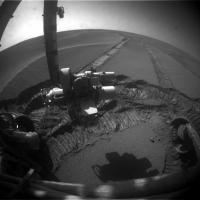
Posted by: fredk Apr 12 2010, 08:55 PM
A few clouds in the sky on sol 2206:
Average of L5 and L6 frames.
Posted by: Hungry4info Apr 13 2010, 01:53 AM
Some interesting stuff from http://twitter.com/marsroverdriver
"Driving went uncommonly smoothly today. That usually means I made a huge mistake somewhere."
"Tomorrow we do a nifty experiment that effectively uses Opportunity's mobility system as a soil-property sensor."
"Nothing particularly nearby... so I think stops will be less frequent for a while."
"Since we're hopping ripples (part of experiment), we check slip 2x as often in this drive. If we get stuck, it won't be bad. "
Posted by: nprev Apr 13 2010, 02:27 AM
Oh my God. They're letting Maxwell use her as a dune buggy!!! ![]()
Posted by: BrianL Apr 13 2010, 03:20 AM
The one I like is, "Monday, if all goes well, we cut east". Looking at GM, this does appear to be a good spot to go cross-ripple and get back to The Thin Blue Line ™. East is good. East, and not stopping for awhile. ![]()
Posted by: Stu Apr 13 2010, 05:20 AM
Bye bye San Antonio... you were a bit of a let-down if I'm honest, so glad to be on our way again...
What we want now is a really big hefty chunka star metal to appear up ahead of us...
Posted by: Shaka Apr 13 2010, 05:24 AM
...with a door in it. ![]()
Posted by: Stu Apr 13 2010, 05:52 AM
![]()
Posted by: Bill Harris Apr 13 2010, 11:25 AM
http://qt.exploratorium.edu/mars/opportunity/pancam/2010-04-12/1P324203117EFFAFDXP2410R1M1.JPG
Ended up getting over 30 L257 Pancam sets yesterday, shows some interesting things about San Antone...
--Bill
Posted by: Stu Apr 13 2010, 05:32 PM
Fascinating features on the ground in this view... lovely wind-sculpting effects...
And Bill, here's your "whoop-tee-doo"...
Posted by: Tesheiner Apr 14 2010, 08:25 PM
The images from yestersol 30m drive are finally down. Navcam pics here: http://qt.exploratorium.edu/mars/opportunity/navcam/2010-04-14/
And looking to this hazcam picture, my impression is that the ripples are becoming really small: http://qt.exploratorium.edu/mars/opportunity/forward_hazcam/2010-04-14/1F324470250EFFAFHLP1202L0M1.JPGBTW, the move was SSE and not due E.
Posted by: Tman Apr 14 2010, 08:40 PM
Wow, that was seemingly a pretty flat passage already!
Posted by: briv1016 Apr 14 2010, 10:33 PM
Have we switched to twice-a-day downlinks for memory clearing the past few days? ![]()
Posted by: djellison Apr 14 2010, 10:50 PM
Don't read too much into how and when images make it online - it is far far more likely that we're seing the downlink split across two of the batch processes that put the images online, rather than two downlinks.
Posted by: briv1016 Apr 14 2010, 11:04 PM
I'm looking more towards the tracking site then Exploratorium. It shows that images are downlinked on a sol way before the 5:00pm (local) afternoon communication session on Mars.
Right now for instance it is 12:45pm local time on Mars on sol 2212 and a good deal of images are already down according to the tracking site.
Edit: Odyssey's orbit was shifted last year to approx 3:45 am/pm local time. Still doesn't account for the early data returns though.
Posted by: Tesheiner Apr 15 2010, 05:52 AM
The data I can see talks about a single daily downlink session currently around 0100UTC.
Posted by: Tesheiner Apr 15 2010, 06:01 PM
Just saw this piece of information on the http://marsrovers.jpl.nasa.gov/mission/status_opportunityAll.html#sol2205.
The right-front and right-middle wheel are exhibiting modestly elevated motor current levels, which the project continues to watch. The plan ahead is more driving.
Posted by: fredk Apr 15 2010, 08:40 PM
Let's hope they don't get any worse than "modestly elevated".
One thing I've been keeping my eye on as we continue southwards is the S to SE horizon. Remember how we had a great view in that direction from Concepcion, then the view worsened afterwards. Looking SE now, towards Iazu, you can see that the horizon is looking pretty rough, which means it's fairly close:
http://qt.exploratorium.edu/mars/opportunity/pancam/2010-04-15/1P324471012EFFAFHUP2411R1M1.JPG?sol2211
You can see the closer horizon start roughly to the south. It covers up the left side of the much more distant horizon in this image:
http://qt.exploratorium.edu/mars/opportunity/pancam/2010-04-15/1P324471518EFFAFHUP2411R1M1.JPG?sol2211
Presumably the close horizon to the S-SE is a bit of a subtle ridge that's blocking our view of the distant horizon. Hopefully this means that once we reach this ridge we'll get a great view of Iazu and parts of Endeavour again.
Posted by: ElkGroveDan Apr 16 2010, 01:59 PM
It looks like we have about two or three more sols of driving before making a hard turn to the East. At that point I think it's safe to say that the ripples of any meaningful size have ended, and by the look of things I can't imagine ever encountering them again.
And after about 20 sols of driving we are going to start getting the view of the horizon back.
Posted by: Bill Harris Apr 16 2010, 02:18 PM
I think Oppy will turn East when she gets to a lane of bedrock about 250m South of San Antonio and this bedrock (The Yellow Brick Road??) looks persistent all the way to Santa Maria.
The distant views to Lazu, Miyamoto, et al seem a little more contrasty, so the air is clearing. The near horizon towards the Mule Ears seems a bit lower and I think that the near horizon towards Lazu will drop once we top that local rise.
Good road ![]() and nice scenery
and nice scenery ![]() . Can life get much better?
. Can life get much better?
--Bill
Posted by: Tman Apr 17 2010, 02:25 PM
Another bit of a straight passage to the East on sol 2213: https://qt.exploratorium.edu/mars/opportunity/navcam/2010-04-17/1N324643261EFFAFHUP1966R0M1.JPG
Between "Mule Ears" and "Rockaway" we've gained more and more space: https://qt.exploratorium.edu/mars/opportunity/pancam/2010-04-17/1P324650188EFFAFPLP2412R1M6.JPG
Posted by: fredk Apr 17 2010, 02:36 PM
That navcam image was taken on 2213, but before that sol's drive. So it shows the eastward jog from sol 2211. The 2213 drive was southwards:
http://qt.exploratorium.edu/mars/opportunity/forward_hazcam/2010-04-15/1F324651649EFFAFPLP1211R0M1.JPG?sol2213
Posted by: Tman Apr 17 2010, 02:50 PM
Aha, right: 1N324643261EFFAFHUP1966R0M1 / 2213 / 12:22:32
Posted by: BrianL Apr 18 2010, 02:23 PM
Looking ahead on the projected route in GM, I interpret the terrain as follows:
300 m Ripple size noticeably reduced (start of mainly eastward travel)
1.4 km Patches of larger ripples return amidst large stretches of exposed bedrock
1.9 km Larger ripples end, increasing amount of exposed bedrock
3.8 km Transition to "tarmac"
5.6 km Big hole in the ground that will probably slow Oppy down for awhile ![]()
Posted by: Hungry4info Apr 18 2010, 11:51 PM
More progress.
Not sure why but I like this image a lot.
Posted by: SFJCody Apr 19 2010, 09:38 PM
Posted by: Tesheiner Apr 19 2010, 10:13 PM
That will be sol 2218 i.e. tomorrow.
Posted by: Bill Harris Apr 20 2010, 02:07 AM
And the wind has apparently increased. As I noted before, once we got past the wind shadow of the topographic rise at Concepcion, the ripple morphology changed with the suggestion of a wind velocity increase.
I have noticed an accumulation of dust in the low-gain antenna since the conjunction stopover at Santorini around Sol 1710. THsi dust collected as a ring around the top of the antenna and was persistent up to the arrival at Concepcion around Sol 2130. A recent Navcam view of the antenna on Sol 2211, after leaving San Antonio craters, shows that the antenna dust is no longer present.
I wonder if there have been recent cleaning events and what the watt-hour readings currently are?
--Bill
Posted by: Poolio Apr 20 2010, 02:15 AM
And what effect, if any, such an event may have had on the Mini-TES?
Posted by: fredk Apr 20 2010, 02:13 PM
You're last image was sol 2211. Last week's http://marsrovers.jpl.nasa.gov/mission/status_opportunityAll.html#sol2205 said:
That 227 level was continuing a slow drop. More importantly the dust factor also continues a slow drop, with some fluctuations from week to week. So it seems any changes on the low gain haven't been accompanied by big changes on the arrays.
Posted by: djellison Apr 20 2010, 02:22 PM
From Scott
~250W-hr/sol as of last downlink.
Posted by: fredk Apr 20 2010, 03:16 PM
We've been having generally a slow decline in power with small week to week fluctuations. That 250 Whr number doesn't tell us too much - maybe the tau dropped a bit from last week and dust factor stayed constant, or maybe tau and dust factor both increased a bit.
Posted by: NW71 Apr 20 2010, 09:42 PM
Evening all
There appears to be relatively little concern on this forum and the jpl site re the power levels for Oppy. Is this due to experience gained and a solar panel clearing event is anticipated/expected or is it simply that these things are in the lap of the gods and hence not worth worrying ourselves with?
Neil
Posted by: Bill Harris Apr 20 2010, 10:53 PM
Over the past six years we've observed The Cleaning Zephyrs breeze by frequently enough that we know that obscured solar panels are not an issue. I had noticed that a 500 Sol accumulation of dust on one of the antennas had disappeared and was wondering if a "cleaning event" had been noted also. This is sometimes related to the output of the solar panels, but can also be dependent upon atmospheric transparency and the annual insolation cycle.
I have seen some Pancam images of the miniTES calibration target recently, so maybe someone at JPL is hoping for improvement of that instrument. 'Twould be nice to have it back.
--Bill
Posted by: helvick Apr 20 2010, 10:55 PM
The situation with Oppy is known to be more benign because she is closer to the equator, not by much but enough to make a difference. Mid winter is on the way but she'll bottom out on power before things get critical unless there is a major additional dust complication. Given that the SH winter season is a lower dust period (in general) the dust problem is not a major concern. That's not to say things aren't tight but that's how things have played out over the past few winters. If there is a positive dust cleaning event or two, then all the better.
I wouldn't necessarily disagree with fredk's assessment that the 250watt hour number is just a blip in tau but it's a pretty big jump from 227, it could well be an indication of a small dust cleaning event. We'll know soon enough in any case.
Posted by: NW71 Apr 21 2010, 09:36 PM
Bill/Helvick,
Thank you for your replies - a lot of good information for me there.
Sometime ago I stated my big fear was Oppy expiring 5 metres from the rim of Endeavour Crater - but now I feel a lot more confident and optimistic... I think we'll get within a metre now! ![]()
Thanks again, and as ever Go Oppy! ![]()
Neil
Posted by: alan Apr 23 2010, 07:00 PM
Short drive on sol 2220, aborted due to excess slip?
http://207.7.139.5/mars/opportunity/forward_hazcam/2010-04-23/1F325276788EFFAG00P1211L0M1.JPG
Posted by: Tesheiner Apr 23 2010, 08:00 PM
That's was my thought too when I saw the picture. She moved "only" 10m.
Posted by: Bill Harris Apr 23 2010, 08:06 PM
Looking at the "right front" wheel in the FHazcam image, the first thought is "whoa, that's starting to dig", but looking at the (stretched, to see shadow detail) RHazcam image the corresponding wheel (on the left) isn't starting to dig in. Yet. So I don't think she's getting into trouble. From the virews from the Navcam and FHazcam, the soil has been quite firm and good to drive on since leaving San Antonio.
--Bill
Added: The Navcam of that track behind the "right front" wheel looks grim...
http://qt.exploratorium.edu/mars/opportunity/navcam/2010-04-23/1N325275553EFFAG00P1992L0M1.JPG
Posted by: eoincampbell Apr 23 2010, 08:48 PM
Could it be that the RM slipped first then the RF slipped on the newly loosened stuff..?
Posted by: fredk Apr 23 2010, 08:51 PM
The dunes are not very large here, so it's surprizing that she seems to've gotten bogged down a bit. And there was the episode soon after leaving San Antonio. It makes me wonder if the dune material (or crust on top) is getting softer as we head south.
Posted by: nprev Apr 23 2010, 08:56 PM
If you look at one of the recent RL track images (will post a link in a sec after I find it), you'll see that all of a sudden the wheel starts sinking a bit in a low spot after hopping a dune.
It looks the the soil surface strength changed very abruptly; perhaps Oppy just drove off the edge of an evaporite crust? If so, doesn't appear to be any good way to discern those before actually driving over them since the dust covers everything.
EDIT: http://qt.exploratorium.edu/mars/opportunity/navcam/2010-04-23/1N325275553EFFAG00P1992R0M1.JPG.
Posted by: Hungry4info Apr 23 2010, 10:13 PM
We can just ask Opportunity's sister about that.
Based on this image, I would guess the observed difference in the surface strength is pretty local. (granted of course the tracks are being seen at different angles, that might throw off this interpretation)
Posted by: Bill Harris Apr 23 2010, 10:25 PM
The dunes in the area are dynamic and have become somewhat mobile. You can see more deflation with the formation of transverse dunes (ripples) and very well-defined laminations on the windward (eastern) slope of the ripples where there is more erosion. There is net deposition on the lee (western) slope and you'd expect the younger material to be, well, "fluffier" than the older, more consolidated material. You would expect to see this looser material to the west (left, in our direction of travel) of the ripple crest. As we run south and east, I'd expect to run into little "surprises" like this until the surface stabilizes.
It's rather like back when we were accustomed to the good traction of the mature surface around Endurance and ran into Purgatory when we got into the longitudinal ripple regime on the way to Erebus.
--Bill
Posted by: Tesheiner Apr 24 2010, 07:59 AM
I'm trying to see what's at the open space behind the RF wheel, i.e. between that wheel and the RM wheel on this fhazcam picture downlinked a few hours ago: http://qt.exploratorium.edu/mars/opportunity/forward_hazcam/2010-04-24/1F325357879EFFAG00P1214R0M1.JPG
I can't see any cleat marks but possibly a "trench", is that right? Would it be an indication that the RM wheel stopped and was dragging the soil and so increasing the resistance to the movement? ![]()
Edited: Here's a crop of the area of interest.
Posted by: dot.dk Apr 24 2010, 08:27 AM
If a wheel stops wouldn't the drive be aborted instantly? ![]()
Posted by: Tesheiner Apr 24 2010, 08:37 AM
No. IIRC a drive is aborted "instantly" if the motor current goes above a defined threshold.
Posted by: Sunspot Apr 24 2010, 09:20 AM
I think you may be right
Posted by: fredk Apr 24 2010, 03:38 PM
I really hope you're wrong, Tesheiner. ![]()
The left frame shows a bit more detail in the "trench":
There clearly is a trench, but it's not clear to me if there are cleats in it or not. There is a hint of a cleat in this left frame. At least the trench isn't perfectly smooth.
If the RM is still turning, but just digging in, then we wouldn't expect clean, well defined cleats like on a normal drive. Notice how the track behind the RF is much more chaotic and jumbled than a couple of metres farther back.
If the RM has stalled, then I'd think the trench would be very smooth. But maybe there would be some structure in it.
Basically, it's wait for more information...
Posted by: djellison Apr 24 2010, 03:42 PM
A stall would result in a dramatic change in the current signature on the motor would it not? Something that would almost certainly flag up a drive fault.
Have we ever heard of a motor stalling, but the drive continuing regardless? I know that Spirit was using a cautious automatic system to recover from stalls within a sol, but for a drive motor to stall on Opportunity and yet the rover carry on driving would be highly unusual.#
I think we're just seing something of an NPE (Near Purgatory Event)
Note, in FredK's image - the 100% perfect track's just outside the churned material. The Front and Rear wheels have similar track width, but the middle wheels are slightly inboard of that. That clear track mark infers the FL wheel turning normally at that time.
Posted by: Sunspot Apr 24 2010, 03:48 PM
Maybe its some soil properties experiment??
But then the latest update does say the right middle wheel has elevated current.
Posted by: Bill Harris Apr 24 2010, 05:05 PM
Agreed. And a Navcam from Sol 2220 suggests that the right Front and Rear wheels were turning and tracking normally and the right Middle wheel started to drag. The right Front wheel then began to churn and veer off to one side, as shown
on the attached annotated NavCam.
Nothing on Scott Maxwell's blog yet.
--Bill
Posted by: fredk Apr 24 2010, 05:06 PM
It's pretty clear what's happened when you look at this navcam frame:
http://qt.exploratorium.edu/mars/opportunity/navcam/2010-04-23/1N325275553EFFAG00P1992R0M1.JPG?sol2220
As Doug said, the middle wheel tracks are normally inwards of the front and rear, as at the top of that navcam frame. Then presumably about a third of the way from the bottom of that frame, the RM wheel started to dig in (stall?), forming a trench (edit - dashed blue in Bill's pic). Then the RF wheel slipped into that trench, so it's track moved inwards a bit to line up with the RM track (dashed yellow in Bill's pic). Then the RR (not FL as Doug said) track was visible outwards of the trench (red in Bill's pic).
The more I think about this the more I lean on the side of a regular embedding event. As I pointed out above, the RM trench isn't perfectly smooth. But also, if the RM stalled outright, I might've expected Oppy to yaw around counterclockwise as her right side was slowed by the dead wheel. But there's no sign of that. Also, I might've expected furrows of soil piled up along either side of the RM track, like with Spirit's RF. Again, no clear sign of that.
We'll find out soon enough...
Edit - thanks for the nice illustration, Bill!
Posted by: ElkGroveDan Apr 24 2010, 05:48 PM
Very impressive Bill.
Posted by: nprev Apr 24 2010, 06:57 PM
New images down:
http://qt.exploratorium.edu/mars/opportunity/forward_hazcam/2010-04-24/1F325357879EFFAG00P1214R0M1.JPG
There's clearly some degree of sinking on the right side as well, so it does look more like a soil composition change rather than a wheel problem on the left side--good news if true!
(Naughty Nprev. Inline image turned into link - ADMIN)
EDIT: Oops, sorry! (Now I finally understand exactly how that works...)
Posted by: Tesheiner Apr 24 2010, 07:12 PM
IIRC, when Spirit's RF wheel failed on the way to McCool hill (http://marsrovers.jpl.nasa.gov/gallery/all/spirit_f781.html) the drive didn't finished immediately but continued enough time to make a long trench.
Now waiting for some official (or "leaked"
Posted by: alan Apr 24 2010, 07:24 PM
Spirit's right front wheel failed on sol 779, the trench was created following tests to determine the nature of the fault.
Sol 781: Spirit completed diagnostic tests and drove 3.9 meters (13 feet) using only five wheels. Diagnostic tests showed that the right-front-wheel problem involved the drive actuator, not the steering.
http://marsrovers.jpl.nasa.gov/mission/status_spiritAll_2006.html#sol778
I see what appear to be two cleat marks in the image fredk posted, the one nearest the wheel partially buried by soil dropped by the right rear wheel.
Posted by: djellison Apr 25 2010, 03:29 PM
Soil mechanics experiment to combine with the previous study of driving cross-ripple that they did. That's my guess.
Posted by: Phil Stooke Apr 25 2010, 03:51 PM
You do the Hokey Cokey...
Posted by: Stu Apr 25 2010, 03:55 PM
Yep, Phil, that's what it's all about...
Posted by: fredk Apr 25 2010, 04:04 PM
What are you guys referring to? If you mean the little wiggle in the tracks about 1/3 down from the horizon in that navcam image, that's just the small turn in place at the end of the sol 2218 drive:
http://qt.exploratorium.edu/mars/opportunity/forward_hazcam/2010-04-21/1F325098918EFFAF1XP1212R0M1.JPG?sol2218
Posted by: eoincampbell Apr 25 2010, 07:38 PM
Was this a new trouble free drive then? How far Algernon? ![]()
Posted by: Tesheiner Apr 25 2010, 07:56 PM
No, just a picture looking backwards taken from the current site.
Posted by: Sunspot Apr 26 2010, 12:06 PM
I'm thinking we would have started hearing things of something had gone wrong with one of the wheels?? ![]() Maybe
Maybe ![]()
Posted by: fredk Apr 26 2010, 02:36 PM
The latest images include soil characterization pancams:
http://qt.exploratorium.edu/mars/opportunity/pancam/2010-04-26/1P325364136EFFAG00P2533L7M1.JPG?sol2221
It looks to me like they're trying to find out what it is about the soil at this spot that made the RM start to dig in.
Posted by: ElkGroveDan Apr 26 2010, 03:03 PM
Posted by: alan Apr 26 2010, 05:27 PM
Oppy not digging in because of the soil. She's climbing a slight grade to reach the outcrops ahead.
Posted by: Floyd Apr 26 2010, 07:03 PM
Its the 5 year time warp. Tomorrow Scott will say something about Opportunity getting stuck ![]()
Posted by: climber Apr 26 2010, 07:36 PM
...and about Spirit getting more sols than Viking II?
Posted by: Tesheiner Apr 26 2010, 08:57 PM
A whole batch of MIs are planned for thisol.
Posted by: Phil Stooke Apr 26 2010, 09:20 PM
An alternative to the idea of 'study the soil to see why we dug in' might be 'got to stop' (for whatever mechanical reason), 'so might as well look at the soil'
Phil
Posted by: Bill Harris Apr 27 2010, 03:33 AM
The soil is rather interesting and they'll spend a couple of sols studying it.
Here is a L257-R721 x-eyed stereo pair. Note the gray tone to the soil rolled by the wheel-- typically, it tends to be a bluish or ocher color.
--Bill
Posted by: Geert Apr 27 2010, 04:37 AM
In some of the earlier http://qt.exploratorium.edu/mars/opportunity/pancam/2010-04-24/1P325274536EFFAG00P2416L2M1.JPG it almost looks like separate layers just below the top of the dunes, certainly the soil seems less uniformly mixed, can't remember having seen this so clearly before.
Posted by: djellison Apr 27 2010, 06:12 AM
Firstly, why not just link to the image at JPL or Expl. ?
Secondly, we've seen that layering in the Meridiani dunes a LOT.
Posted by: CosmicRocker Apr 28 2010, 06:01 AM
Those layers are normally visible in the images made with the infrared filters like the L2. They have been apparent in many places where the drifts have been imaged with the appropriate filters. Those layers define the internal structure of the dunes/drifts/ripples. The edges of those layers are exposed on the eastern side of the dunes because the last time the dunes were actively moving, the prevailing wind was coming from the East. When wind has been able to move the sediment, the windward side has been an area of net erosion and the leeward side has been an area of net deposition. The dune/ripple moves in a downwind direction in that manner. Sand grains removed from the windward/eroded side deposit as new layers on the leeward side of the moving landform.
http://www.unmannedspaceflight.com/index.php?s=&showtopic=6535&view=findpost&p=158991 a few days ago when he was theorizing about traction.
It's a good observation, whether it is old or new
Posted by: nprev Apr 28 2010, 06:38 AM
New MIs down. Lotsa small blueberries http://qt.exploratorium.edu/mars/opportunity/micro_imager/2010-04-27/1M325620085EFFAG00P2959M2M1.JPG, might explain the observed slippage/sinking.
Posted by: fredk Apr 29 2010, 02:00 PM
On the road again...
http://qt.exploratorium.edu/mars/opportunity/forward_hazcam/2010-04-29/1F325810297EFFAGB5P1211R0M1.JPG?sol2226
Posted by: Tesheiner Apr 29 2010, 02:13 PM
Back to "business". ![]()
Today's drive was about 25m S.
Posted by: Sunspot Apr 29 2010, 04:21 PM
That's a welcome sight.
Posted by: ElkGroveDan Apr 29 2010, 06:45 PM
An excuse for four to six days of wheel rest?
Posted by: Bill Harris Apr 29 2010, 06:48 PM
http://qt.exploratorium.edu/mars/opportunity/forward_hazcam/2010-04-29/1F325810297EFFAGB5P1211L0M1.JPG
Good progress.
--Bill
Posted by: fredk Apr 29 2010, 07:19 PM
Hard to tell yet, but there's a multi-filter pancam view from 2220 that shows it at slightly better resolution:
http://qt.exploratorium.edu/mars/opportunity/pancam/2010-04-23/1P325274745EFFAG00P2416R1M1.JPG?sol2220
http://qt.exploratorium.edu/mars/opportunity/pancam/2010-04-24/1P325274536EFFAG00P2416R2M1.JPG?sol2220
(Bill, I think we're just seeing pretty local dunes in that fhaz view.)
Posted by: Stu Apr 29 2010, 07:24 PM
Genius...
Posted by: BrianL Apr 29 2010, 07:57 PM
Er guys...? What's that, over there, on the left, on the horizon...? An excuse for 4 to 6 months of steady driving?
Posted by: Phil Stooke Apr 29 2010, 07:57 PM
Meh - just a rock...
Phil
Posted by: Bill Harris Apr 29 2010, 08:26 PM
"just a rock..."
Bite yo tongue... Rockses is good.
We're starting to see some differences during this (nominal) eastward journey. Changes in the dune morphology. A slight trend towards smaller Blueberry diameters. And with the last couple of stops, the bedrock has changed. Instead of the usual wind-rounded, polygonal paving stones we are seing finely-layered, freshly eroded surface with angular intersecting fractures. I don't see anything suggesting a buried crater, so this may not be a local change. We'll keep an eye out.
An L257 Pancam from Sol 2224:
Posted by: Stu Apr 29 2010, 08:31 PM
Whenever I read "It's just a rock" I always think "But it's a rock ON MARS...!!" ![]() Each rock is an amazing thing, a little piece of an alien world that will, in all likelyhood, not be seen, or examined again, for what, another half a century at the earliest? Each rock has its own history, it's own journey, its own secrets, and is where it is for a reason. So personally I'm happy every time I see one of them just sitting there, out in the Big Country desert of Meridiani.
Each rock is an amazing thing, a little piece of an alien world that will, in all likelyhood, not be seen, or examined again, for what, another half a century at the earliest? Each rock has its own history, it's own journey, its own secrets, and is where it is for a reason. So personally I'm happy every time I see one of them just sitting there, out in the Big Country desert of Meridiani.
Every rock is a potential treasure chest; we just need to find the right key to open it up ![]()
Posted by: Phil Stooke Apr 29 2010, 08:38 PM
Yeah, yeah, I know. I just wanna drive!
Phil
Posted by: Stu Apr 29 2010, 08:48 PM
Patient, you must be. Hills: far away are. Rush, there is not.
![]()
Posted by: Bill Harris Apr 29 2010, 09:53 PM
Drive we are. But she has to stop every few days to rest the balky motor and replenish the accumulators, so we might as well rest in a useful spot.
--Bill
Posted by: belleraphon1 Apr 29 2010, 10:55 PM
Rush, there is...
"Gold" ahead in them thar ramparts... drive we must.
Posted by: fredk Apr 30 2010, 01:44 AM
From the http://marsrovers.jpl.nasa.gov/mission/status_opportunityAll.html#sol2219
Posted by: Bill Harris Apr 30 2010, 09:54 AM
This is puzzling. From the update on the URL you gave (...html#2219), and even removing the "#2219" suffix, nothing is said past SOl 2218 (April 20). Even clearing my disk cache and forcing a new "read" of the page, nothing. Reason it's puzzling is that I've checked that update page every day.
Opportunity drove three times in the last week, spending time between drives to recharge her batteries. Because of the approaching winter solstice, solar array energy levels have been dropping.
<snip>
Anyway, glad that the problem was a non-problem.
--Bill
Posted by: Astro0 Apr 30 2010, 10:52 AM
http://marsrovers.jpl.nasa.gov/mission/status_opportunityAll.html#sol2219: up to Sol 2226 (April 28, 2010)
sols 2212-2218, April 21-28, 2010: Opportunity's Balancing Act
Seems to work for me.
Posted by: Bill Harris Apr 30 2010, 01:22 PM
Still puzzling and still showing the old April 20 update. I'll fiddle with it when I get time...
Thanks!
Posted by: fredk Apr 30 2010, 02:10 PM
The new update is there, at the top, but they forgot to change the old sol range in the title. The title says "sols 2212-2218", even though the rest of the update is new.
Posted by: Ipparchus Apr 30 2010, 04:02 PM
Scott Maxwell tweeted me some interesting things: "Oppy did fail a slip check, measuring 58% slip. (Limit's 40%.) She's already driven away; IDD work was just during recharge. Slip check failed because she was on ripple's soft side. Surprisingly, west side's softer (looser material) than east side. Had to stop for a few days to recharge anyway, so just went ahead and did some IDD work while we were there."
Why do you think "west side's softer (looser material) than east side"? ![]()
Posted by: fredk Apr 30 2010, 04:20 PM
Have a look at http://www.unmannedspaceflight.com/index.php?s=&showtopic=6535&view=findpost&p=158991
Posted by: fredk May 1 2010, 02:31 PM
Another drive on sol 2228, another stunning low-sun-angle hazcam view:
http://qt.exploratorium.edu/mars/opportunity/forward_hazcam/2010-05-01/1F325988172EFFAGEIP1212R0M1.JPG?sol2228
And the sol 2226 drive included some mighty fine dune negotiation:
http://qt.exploratorium.edu/mars/opportunity/navcam/2010-05-01/1N325884752EFFAGB5P1605R0M1.JPG?sol2227
Posted by: fredk May 1 2010, 04:56 PM
The new http://www.planetary.org/news/2010/0430_Mars_Exploration_Rovers_Update_Spirit.html
Not much new this month. Probably the most worthy quotes are some great lines from our Stu:
(Stu, be sure to be careful when you lean on Oppy - she's delicate!
Posted by: Tesheiner May 1 2010, 08:16 PM
Today's drive was quite short, "only" 25m, but enough to place the rover next to the rock we saw on the pictures taken two days ago.
Check the map on the route thread and this annotated image. It's the navcam mosaic taken on sol 2226 and the current position is represented by the yellow ellipse. There're no navcam or pancams from this position on today's batch; they are planned to be shot tomorrow.
Posted by: Bill Harris May 1 2010, 11:19 PM
We should be looking forward to the images in the current queue. I'm hoping that they made an L257 and R721 series of the auto-nav save from Sol2226 and, of course, The Current Interesting Rock (sorry, it's in my genetic makeup).
Especially the Sol2226 maneuver. Out in the field, you'll frequently pick up a handful of soil. Roll it between your fingers, squeeze it in your palm, sniff it, look at it closely and get a feel for what it's made of. It's all part of figuring the geology.
Geology is important, since without it, the geography would have nothing to sit upon... ![]()
--Bill
Posted by: Phil Stooke May 2 2010, 02:54 AM
"Geology is important, since without it, the geography would have nothing to sit upon..."
Very good!
Phil
Posted by: ElkGroveDan May 2 2010, 06:06 AM
Not to mention as a nearly endless source of puns. It would be gneiss if more people appreciated that.
Posted by: Bill Harris May 2 2010, 08:46 AM
Indeedie, people take it too much for granite.
(sorry, that one's old enough to have whiskers) (twiddling thumbs waitin' for new images to come down) ![]()
--Bill
Posted by: nprev May 2 2010, 09:04 AM
Yeah, that one was definitely a bit shale, Bill.
Posted by: Astro0 May 2 2010, 01:44 PM
Ooo, that one was definitely adding basalt to the wounds ![]()
Sorry, I'll go now.
Posted by: Stu May 2 2010, 02:10 PM
Worth a few days' rest to investigate, or scoot right past..?
And a luvverly 3D view of the dunes...
http://twitpic.com/1kbmnf/full
Posted by: Stu May 2 2010, 03:27 PM
This is a beautiful spot, isn't it?
http://twitpic.com/1kc8ce
Posted by: Bill Harris May 2 2010, 03:34 PM
First thought is "nothing unusual, just a piece of the kieserite bedrock 'round here". Second thought is "why? we usually don't see pieces of this rock sitting alone on the plain". No fresh craters nearby. This rock is finely-laminated, as we've seen in this vicinity recently, but it is slightly bluer than the surrounding rock, which appears to be in-situ. Third thought is that it may be a piece of ejecta from a Meridiani impact many miles away, with the added possibility that it has been recently uncovered by shifting sands.Image file not loading; I'll edit it in later. Done.
--Bill
Posted by: alan May 3 2010, 12:17 AM
Image was taken after backing away from spot where slip limit was triggered, at start of the drive on sol 2226.
Posted by: Hungry4info May 3 2010, 12:18 AM
Gah, my bad.
Posted by: CosmicRocker May 3 2010, 04:53 AM
In rockhound parlance, that is one we'd call a http://www.google.com/search?q=define:leaverite.
In keeping with the recent trend toward geologic puns, it could be called "a pebble without a cause."
Posted by: CosmicRocker May 3 2010, 08:01 AM
Very good! ...
That's really quite good. ...nice work, Bill.
Posted by: algorimancer May 3 2010, 02:40 PM
As we get closer to Endeavour's rim it seems likely that there ought to be ejecta from the "interesting" rocks on the peak scattered about. These ought to be very distinct, both in terms of appearance and chemistry (phyllosilicates) as compared to the evaporite scattered about the plains. Some of these rocks may have been thrown quite a distance.
From another post I encountered the quote:
"Scott Maxwell: According to the science team member I asked, the phyllosilicates are expected to show up starting 200-500 meters from the rim (hence, starting outside of the wall). That's still another 11-12km from here, so we have a way to go yet! ... "
Due to the random nature of impact ejecta, some of these phyllosilicate rocks will have been tossed quite a bit further than that. Does anyone have some notion as to how these rocks might differ from the evaporite chunks and meteorites already encountered? More likely to be basaltic? Or perhaps another variety of sedimentary rock ostensibly similar to the evaporite? Distinct color? Would they show-up on HiRise imagery?
Posted by: centsworth_II May 3 2010, 04:16 PM
My understanding is of course subject to correction.
Posted by: fredk May 3 2010, 04:38 PM
Presumably any sizable impacts into the exposed Endeavour rim after the Meridiani sediments were laid down could spread ejecta containing phyllosilicates on top of the Meridiani sediments. There are smaller craters superimposed on Endeavour's rim, but my guess is any ejecta from these would be few and far between this far out.
Posted by: algorimancer May 3 2010, 04:42 PM
Actually I was referring to ejecta from more recent impacts into the rim, rather than ejecta from the original impact. The recent ejecta may still be around. Incidentally, I browsed through some imagery of Endeavour's rim and it looks like the phillosilicate-rich rock near the peaks is very light-toned, perhaps even yellowish. It might be difficult to tell from the evaporite bedrock; perhaps it is even sedimentary.
Posted by: centsworth_II May 3 2010, 05:11 PM
Posted by: Ant103 May 3 2010, 08:43 PM
From sky to the rover, on Sol 2229 ![]()
http://www.db-prods.net/marsroversimages/Opportunity/2010/Sol2229-pancam.jpg
Posted by: Stu May 3 2010, 09:16 PM
Lovely pic, Ant.
Cute how the ball on top of the sundial looks like a miniature Mars globe... ![]()
Posted by: Tesheiner May 3 2010, 11:28 PM
An artistic shot, really. It was named "Moment in Time".
Posted by: Bill Harris May 4 2010, 01:30 AM
What is the story behind the "L1" (clear filter/no filter) Pancam sequence today (Sol 2223)? Given the characteristics of the silicon CCD, the color sensitivity ought to be broadband in the red-IR range. I can't hardly remember the last time we used the L1 Pancam filter.
--Bill
Posted by: nprev May 4 2010, 01:54 AM
Spectacular pic, Ant!
Oddly reminds me of Viking shots, probably because of the spacecraft in the foreground.
Posted by: djellison May 4 2010, 02:56 AM
L1 pans are often done in conjunction with orbital observations for albedo obs.
Posted by: fredk May 4 2010, 03:08 AM
We see L1 horizon sequences from time to time. Here's a recent example:
http://marsrovers.jpl.nasa.gov/gallery/all/opportunity_p2199.html
As I recall, they're called albedo pans and they're matched with orbiter imagery, though someone can correct me if I'm wrong.
What's odd is that they're always downsampled to 512 by 512. This is the only one I recall at full resolution.
Edit - like Doug says.
Posted by: James Sorenson May 4 2010, 07:47 AM
In Ants "Moment in Time" image, I have wondered for a long time if anyone has noticed that the white ring (on the sundial) has lifted up over the coarse of the mission. What process would cause this?
Posted by: ElkGroveDan May 4 2010, 05:03 PM
Interesting. Just a guess but perhaps it's being caused by deterioration of an adhesive (and I have no idea if any kind of adhesives were even used on the MERs).
Posted by: Bill Harris May 4 2010, 05:14 PM
Agreed, I'd guess the thermal cycling over 6 years caused it to loosen and/or warp.
Not to edge over to kookiness, but does anyone have ideas/theories about the dark blue "stain" on the deck to the left-rear (as viewed) of the sundial? ![]() I've noticed it for a while, but haven't figured it out.
I've noticed it for a while, but haven't figured it out.
--Bill
Posted by: eoincampbell May 4 2010, 06:30 PM
Weird indeed, seems to creep up onto the solar cell... soil? ...from Victoria?
Posted by: James Sorenson May 4 2010, 06:46 PM
The dark blue "stain" looks to me to be just dark soil that has built up, this has been seen before on the solar panels. The white ring warping up is pretty interesting, also to note this has not happened to Spirit's sundial. It would be interesting to assemble a time-lapse movie of Oppys sundial over the coarse of the mission.
Posted by: fredk May 4 2010, 07:03 PM
About Bill's dark "stain" near the sundial, if it were dust deposition I'd think it should be similar colour to the rest of the dust on the rover, ie light Mars coloured. My guess is that it's an area where the dust has been removed. Wind blowing past the sundial could set up eddy currents on the lee side, which might scour the dust from that area.
Posted by: Bill Harris May 4 2010, 08:03 PM
It is mysterious. My take, for the time being, is that is is an aeolian phenomemon. Either a wind eddy keeping the solar panel clean or "density sorting" by the wind-- a collection of dust with a higher density. It has an indigo color in IRB, characteristic of a basaltic material, which is denser than the ocher evaporitic material.
Just curious...
--Bill
Posted by: Stu May 5 2010, 05:39 AM
3D view of interesting outcrop...
http://twitpic.com/1l5v3b
Posted by: monty python May 5 2010, 05:53 AM
Yes it is. I wonder how that chunk of rock fell off onto it's side. Then I look around the outcrop and wonder if their isn't a softer layer in it where "debonding" occurs. I see a strata eroded into the rock.
Posted by: eoincampbell May 5 2010, 04:16 PM
Almost seems that you could take a spade, jam it under the slab, lever and remove...
Posted by: Bill Harris May 5 2010, 06:05 PM
Here is hoping that this trend for changes in the geology will keep up. Recently we saw that nice, rounded evaporite boulder (named Newfoundland?) sitting by itself. Now we see a bedrock slab that has apparently moved. If this were an ancient buried crater being exhumed we would see signs of arc-shaped rim remnants in the orbital images, as we did at Erebus and the unnamed crater we skirted between Shelter Island and Marquette. One thing that can cause collapse is solutioning (solution cavities) caused by groundwater. Given the Anatolia features, vugs seen at (?? oh my, that crater we landed in), and possible fracture fill in several locations it is clear that this is a karst landscape. Now that we are getting near to the slope, the potential surface for the groundwater can create more movement.
We'll see. The journey continues.
--Bill
Posted by: Pertinax May 5 2010, 08:12 PM
Eagle
-- Pertinax
Posted by: Bill Harris May 5 2010, 09:39 PM
Eagle, one of those "E"-words (Endurance, Endeavour), and a good old hole-in-one golf term, too.
Thanks...
--Bill
Posted by: climber May 6 2010, 06:45 AM
Yes, knowing it start with a E is of no help actually!
A question to Bill: I thought you expected a dramatic change only when we would start going down to Endeavour. I have the feeling that you start to may be already "feel" the rim where we are now? Am I right? If so, is it due to the ground trust (which is 2 orders or magnitude (IIRC) better than HiRise) or a global analyse?
Thanks.
Posted by: CosmicRocker May 6 2010, 07:19 AM
Speaking of geologic changes, I've been wondering about the phyllosilicates observed in and near Endeavour's rim. The phyllosilicate group contains a lot of different minerals, not all of which are clay minerals. I was going to ask if anyone here had more specific information about which phyllosilicate minerals had been detected from orbit. Instead, I managed to find a paper with those and many other interesting details. It contains imagery showing many of the CRISM identified anomalies on and near the rim segments Opportunity is heading for.
This is a very interesting paper for anyone interested in this subject. It contains stratigraphic and structural information about the relationships between the Meridiani sulfate sediments and Endeavour's rim rocks. It says that ferro-magnesian smectite clay minerals are indicated by the spectra of the rim, and polyhydrated sulfates are seen in the plains to some distance west of the rim.
The "Discussion and Conclusion" section makes it clear just how important a role Opportunity can play in elucidating the early story of water on Mars...the time before the water became acidic...the transition between the end of the formation of such clay minerals and the beginning of the era of acid sulfate deposition.
http://www.planetary.brown.edu/pdfs/3954.pdf
Posted by: ngunn May 6 2010, 11:02 AM
Hey, that's really great. Thanks for posting.
Posted by: Bill Harris May 6 2010, 11:12 AM
Good reference, CR. I neeed to dig more and keep up on the current literature.
Climber-- In geology, you notice subtle changes. Although I talk like it will be sudden and profound, the changes will be very small and happen slowly. We will see more change in the next year than we have seen in the previous six years. This will be primarily because we are going downhill topographically and therefore downward in the geologic column.
The best illustration I've seen comes from the paper that Cosmic Rocker just mentioned:
http://www.planetary.brown.edu/pdfs/3954.pdf
Attached is a clip from Figure 1 of that paper, showing a topgraphic and geologic cross-section of the traverse from Eagle to Endeavour. Note the horizintal layers with hematite, horizontal layers with hydration signatures and phyllosilicale-bearing layers. All of which indicate different depositional environments. Or climates.
Currently, Oppy is at the 10-11 Km distance mark.
--Bill
Posted by: climber May 6 2010, 07:11 PM
Thanks Bill.
I also noticed in the paper that Mini-Tes will get readings.
Is it still usable or is there still too much dust on it? Then, I can't remember how far from Columbia Hills it was used on Spirit so, does somebody knows how far from Endeavour it could be used and get decent readings?
Posted by: Bill Harris May 6 2010, 09:02 PM
In a couple of messages scattered between here and the "Distant Vistas" thread I've mentioned the geology, the lithology (rock types) and the topography and it how it all relates to what we're seeing here. In today's Planetary Society Blog, Emily discusses geomorphology ("how the geology got the way it is") with reference to another area, the Nili Fossae region near Syrtis Major. Well worth the read.
http://www.planetary.org/blog/article/00002472/
--Bill
Posted by: fredk May 7 2010, 02:03 AM
http://marsrovers.jpl.nasa.gov/spotlight/20100506a.html
Edit - more details http://www.planetary.org/blog/article/00002474/
Posted by: nprev May 7 2010, 02:10 AM
Way to go. Emily! ![]()
Posted by: elakdawalla May 7 2010, 03:19 AM
Got a HiWish image and had my finger in the pot for an Opportunity color photo, all in the same week! ![]()
![]()
![]()
Posted by: fredk May 7 2010, 04:13 AM
Oh my how fun it'd be to enter the "location" field on the http://submit.nytimes.com/moment for Oppy's image...
Posted by: nprev May 7 2010, 04:26 AM
I tried 'Meridiani Planum, Mars', got a 'sorry, we couldn't find that location'. What, no Google Mars plug-in?! ![]()
(Pretty sweet week all right, Emily!)
Posted by: fredk May 7 2010, 01:22 PM
We've heard mention that Oppy might need to stop on a north facing dune since power levels are quite low, and it looks like http://twitter.com/marsroverdriver/status/13525272608 I can't imagine she'd need to park for very long, though.
Posted by: Floyd May 7 2010, 02:37 PM
The title of this thread was a little ahead of itself. From sol 2197 through 2231 we have gone about 400m south and about 100m east. So I guess its SSSE from San Antonio to the next waypoint. ![]()
Posted by: Bill Harris May 7 2010, 09:07 PM
Not necessarily. The plan may have been (or we thought it was) to turn eastward (as in Tim Parker's map in 2838.pdf), but the route in Figure 1 in the Phyllosilicate paper (3954.pdf) would certainly indicate a southeast heading in that direction. The southwesterm Endeavour rim may be a better target.
--Bill
Posted by: fredk May 7 2010, 09:12 PM
I'm hoping for an eastwards turn soon...
Meanwhile, after the latest drive we seem to have ended up with our rear wheels on the north end of a dune, which has given us a bit of a northward (sun favourable) tilt:
http://qt.exploratorium.edu/mars/opportunity/rear_hazcam/2010-05-07/1R326521786EFFAGK2P1312R0M1.JPG?sol2234
Posted by: Phil Stooke May 8 2010, 01:05 AM
Bill, that line in the paper is not a route, it's the location of the cross-section.
Phil
Posted by: Bill Harris May 8 2010, 01:34 AM
Oh... so it is.
Nevermind. ![]()
Posted by: Tesheiner May 9 2010, 11:35 AM
http://qt.exploratorium.edu/mars/opportunity/rear_hazcam/2010-05-07/1R326521786EFFAGK2P1312R0M1.JPG?sol2234
I'm wondering if this place will be a sort of "winter haven", given the limited energy.
Posted by: BrianL May 9 2010, 02:21 PM
I would hope not. With lots of ripples to choose from, perhaps they could make short drives and still find a spot to finish up with a favorable tilt.
Posted by: fredk May 11 2010, 01:57 AM
http://twitter.com/marsroverdriver/status/13754781845
Posted by: brellis May 11 2010, 06:54 AM
urrgh, better safe than sorry!
Posted by: Astro0 May 13 2010, 05:37 AM
Nice credit for Emily in JPL article today covering that Moment In Time image.
http://www.jpl.nasa.gov/news/news.cfm?release=2010-152a
Emily's suggestion for this image has continued to spread to a worldwide audience. That's outreach at its best! ![]()
Big thanks also go to Jim Bell and the MER Team for thinking it was a great idea and for making it possible.
And a pat on the back for JPL and the DSN for transmitting the commands and receiving the data of course (I could hardly leave them out now, could I!?)
Posted by: Floyd May 13 2010, 09:22 PM
So I originally thought Scott's Tweet indicated the drive would be delayed one day. We aren't parked until after winter solstice are we?? Anyone know Opportunity's mobility status?
Posted by: elakdawalla May 13 2010, 09:25 PM
Floyd, you know that the winter solstice is today, right?
Posted by: Poolio May 13 2010, 09:27 PM
The latest http://marsrover.nasa.gov/mission/status.html#opportunity says a drive was planned for sol 2240.
Posted by: Floyd May 13 2010, 09:52 PM
Thanks Poolio, I had missed today's update. Emily, I didn't know it was today, thought solstice was a week or so off ![]() I keep looking for snow in the images to let me know it is the dead of winter--I'm from New England
I keep looking for snow in the images to let me know it is the dead of winter--I'm from New England ![]()
Posted by: briv1016 May 13 2010, 09:55 PM
According to the latest update they're using the "lily pad" driving technique used by Spirit in the past.
Posted by: fredk May 14 2010, 03:23 AM
A drive to celebrate the solstice, again parking on a bit of a northerly slope:
http://qt.exploratorium.edu/mars/opportunity/rear_hazcam/2010-05-13/1R327048523EFFAGN3P1312R0M1.JPG?sol2240
Another larger-than-average dark cobble up ahead. Could be regular Meridiani rock, way too early to tell:
http://qt.exploratorium.edu/mars/opportunity/pancam/2010-05-13/1P327046251EFFAGN3P2429R2M1.JPG?sol2240
Posted by: Stu May 14 2010, 07:20 AM
Updated my "Road to Endeavour" blog with some new 3D images, and a close-up of that rather cute spiral-patterned dune slope up ahead...
http://roadtoendeavour.wordpress.com/2010/05/14/slow-progress-through-the-dunes
Posted by: Tesheiner May 14 2010, 08:28 AM
This last move was some 20m due south. Map update soon.
Posted by: walfy May 14 2010, 07:12 PM
And on the winter solstice!
Posted by: fredk May 19 2010, 02:13 AM
We've hit the road again. And it looks like a cobble up ahead:
http://qt.exploratorium.edu/mars/opportunity/rear_hazcam/2010-05-18/1R327496440EFFAHDJP1312R0M1.JPG?sol2245
Posted by: Astro0 May 19 2010, 04:17 AM
There's something I really like about this Navcam image
http://qt.exploratorium.edu/mars/opportunity/navcam/2010-05-18/1N327393926EFFAH00P1607R0M1.JPG
Just like rolling waves...beautiful. ![]()
Posted by: nprev May 19 2010, 04:43 AM
Sail on, Oppy, sail on... ![]()
Posted by: Tesheiner May 19 2010, 05:41 AM
This drive was not a "small" bump to a close northward facing ripple but more like a normal 50+ meters move. Actually, 55m SSE according to the rover's own mobility info.
Posted by: akuo May 19 2010, 10:37 AM
As far as I can see, Oppy has now claimed the top position in number of (confirmed) operational sols on the surface of Mars. Viking 1 functioned for 2245 sols. Spirit will in all likelihood take the top position again in a couple of months, but at the moment we cannot be sure that she is OK.
Another milestone claimed by the MER team, and one I definitely didn't think was going to be broken by the rovers.
Posted by: NW71 May 19 2010, 11:27 AM
Does this signify the start of the straight(ish) run towards Endeavour crater or is that a little premature?
Neil
Posted by: Hungry4info May 19 2010, 12:08 PM
I'd say a bit premature. It's not uncommon for Opportunity to head SSE over the past few weeks.
Posted by: climber May 19 2010, 12:49 PM
I'll say that Oppy will soon resume the 70m drive once Solstice will be behind her a bit more. Next issue will be Opposition that'll occur sometimes next January (correct me if I'm wrong).
There's no means to know whether she'll drove steadily till then since a one (or more) month stop at an interesting target could happen anytime but I wonder if planners already forecast any target of interest for a 3 weeks study without moving when this will occur.
Posted by: NW71 May 19 2010, 10:08 PM
I'm really tempted to give the glib answer and say there's a really large crater SE of Oppy which should keep it busy for 3 weeks or so!
Seriously though, I'm interested in the problems associated with Opposition next January. Does the new software on the Rovers negate this issue or will it still affect travel during this period?
Neil
Posted by: fredk May 20 2010, 02:08 AM
It looks like just a slab of ordinary Meridiani bedrock:
http://qt.exploratorium.edu/mars/opportunity/pancam/2010-05-19/1P327573236EFFAHDJP2435R1M1.JPG?sol2246
Nothing here. Move along...
Posted by: djellison May 20 2010, 02:28 AM
New software is great - but a big fat radio source getting in the way of a spacecraft can't be avoided with a software feature. Typically, the rovers park up for about 10 days, and conduct a pre-programmed schedule of in-situ science and/or remote observations. To plan a drive, you need data. With the sun in the way, you can't get it reliably.
Posted by: alan May 20 2010, 04:05 AM
If I was driving this patch of pavement would be where I turned left to begin the eastward trek.
Posted by: jamescanvin May 20 2010, 07:20 AM
I thought exactly the same thing when I saw Tesh's map yesterday Alan. We must be very close to the turning point and this pavement looks ideal. ![]()
![]()
Posted by: kenny May 20 2010, 09:26 AM
Well, I was also thinking it's high time we turned east. We're 19 pages into this thread entitled "Eastward" and it's still inappropriately named, as we continue going south...
Posted by: Bill Harris May 20 2010, 12:10 PM
And the near horizon continues to clear...
--Bill
Posted by: Tesheiner May 20 2010, 12:31 PM
Usually, the "post-drive" mosaics (both pancam and navcam) give a hint about the heading of the next move.
But in this case, although the navcam is centered at 162º indicating a potential east turn, the pancam mosaic is pointing (almost) due south. 50 / 50 chances.
BTW, I'm updating the thread title...done.
Posted by: Phil Stooke May 20 2010, 01:36 PM
http://marsrovers.jpl.nasa.gov/mission/tm-opportunity/images/MERB_Sol2243_1.jpg
This map by Tim Parker shows very clearly, in the upper right corner, the patch of large drifts that was the final obstacle to be avoided on this long trek. We have finally passed it, so a turn must be happening in the very near future. Then just watch that horizon change!
Phil
Posted by: Ant103 May 21 2010, 04:48 PM
Sol 2246 drive direction pan
http://www.db-prods.net/marsroversimages/Opportunity/2010/Sol2246-pancam.jpg
Posted by: Tman May 23 2010, 07:42 PM
Now we have the eastward track ahead on sol 2249's drive direction pics:


Posted by: Tesheiner May 24 2010, 05:33 AM
That's a good indication the eastward trek will start soon.
Posted by: BrianL May 24 2010, 03:40 PM
Scott just tweeted, "Good: driving Opportunity today".
Perhaps soon time for a new thread to mark the turn east?
Posted by: fredk May 26 2010, 02:34 PM
The latest drive (2252) looks like a substantial move east:
http://qt.exploratorium.edu/mars/opportunity/forward_hazcam/2010-05-26/1F328108506EFFAHK9P1201R0M1.JPG?sol2252
Maybe it's too early to be sure after just one drive east, but this may be the start of the next leg in our journey.
Posted by: Tesheiner May 26 2010, 04:44 PM
Around 55m ESE. We'll better wait for a few additional moves to confirm this trend but I think (or wish) they'll move east whenever possible from now on.
Posted by: Bill Harris May 26 2010, 04:54 PM
We're seeing interesting surfaces to the bedrock along with interesting erratics laying around. I suspect that we are seeing an old paleo-surface being exhumed, with the sand being eroded and making a thinner cover.
L257 Pancam from Sol 2247. Note the brownish color of the pebbles as well as the wind-tails.
--Bill
Posted by: Oersted May 27 2010, 07:53 AM
backseat drivers y'all ![]()
Posted by: Astro0 May 27 2010, 09:10 AM
If this really the turn final east, could we call the waypoint 'Albuquerque' ![]()
As in "I knew I shoulda taken that left turn at..." http://www.youtube.com/watch?v=e8TUwHTfOOU
Posted by: Bill Harris May 27 2010, 10:20 AM
Or "Niagara Falls"...
As in "Niagara Falls! Slowly I turned ... step by step ... inch by inch ..."
http://en.wikipedia.org/wiki/Slowly_I_Turned
http://www.youtube.com/watch?v=nr6VBg1SiYI
--Bill
Posted by: tacitus May 27 2010, 05:00 PM
Seems to me that continuing on the same track is almost certain at this point. Directly to the south of the current track there is an area of sand where there is no exposed bedrock at all. It looks like there could be an old crater under there, and if the sand is a little deeper as a result, then there really is little option but to continue ESE for another 100m or more.
Posted by: Stu May 27 2010, 05:48 PM
Fascinating new leg of the journey coming up. I hope Exploratorium gets back up to speed soon; it's really been struggling the past few days.
Posted by: Hungry4info May 28 2010, 09:13 AM
From http://www.exploratorium.edu/mars/raw_data.html:
The computer that we use for hosting the raw Mars Rover data had a serious meltdown recently. We will be rebuilding it and will hopefully have your beloved raw data flowing in a few days. Sorry for the inconvenience. Who knew that hard drives don't last forever (or that the Rovers would be such troopers!)
- Ron 2010-05-27
Posted by: briv1016 May 28 2010, 11:44 AM
Somebody’s going to have a long Memorial Day weekend. ![]()
Posted by: Tesheiner May 28 2010, 03:33 PM
Ok, since the images server is down we will have to live with the mobility data provided by the tracking web.
Last drive, which was yesterday during sol 2254, covered some 25m heading southeast.
Posted by: Ant103 May 28 2010, 09:05 PM
Sol 2251 color view :
http://www.db-prods.net/marsroversimages/Opportunity/2010/Sol2251-pancam.jpg
Posted by: NW71 May 28 2010, 09:32 PM
Thanks for that colour view Ant103.
When you look at the picture in detail the differing terrain between the left and right hand side of the image is really noticeable. I know a great deal of posts in this forum have discussed the future route but just to be clear, I would assume we will be taking the left hand route as it looks considerably smoother?
Neil
Posted by: Phil Stooke May 28 2010, 09:46 PM
We should be going to the left in that view, but most of the difference in texture in the image is caused by lighting angles. On the right you see lots of shadows, on the left the shadows are hidden behind the drifts. There isn't really much difference in texture between the two sides of the image.
Phil
Posted by: JayB May 29 2010, 12:55 AM
couple of tweets from Scott today
Energy levels not spectacular; drive truncated to 30min or so; will go 15-25m. Shooting for a spot where we'll recharge well over weekend.
On the plus side, we had a cleaning event this week, so energy levels are maybe 10% (or more) higher than they would be otherwise.
Posted by: briv1016 May 29 2010, 01:54 AM
Exploratorium is back up. ![]()
Posted by: Stu May 29 2010, 05:49 AM
![]() I still can't get on...
I still can't get on...
Posted by: Stu May 29 2010, 06:39 AM
Hmmm. I can get to the front page, but clicking on the individual camera links brings everything to a stop.
Sigh.
Posted by: Tman May 29 2010, 08:05 AM
Stuart try (http instead of https) http://qt.exploratorium.edu/mars/opportunity/pancam/?C=N;O=D
http://www.wisegeek.com/what-is-the-difference-between-http-and-https.htm
Powered by Invision Power Board (http://www.invisionboard.com)
© Invision Power Services (http://www.invisionpower.com)


